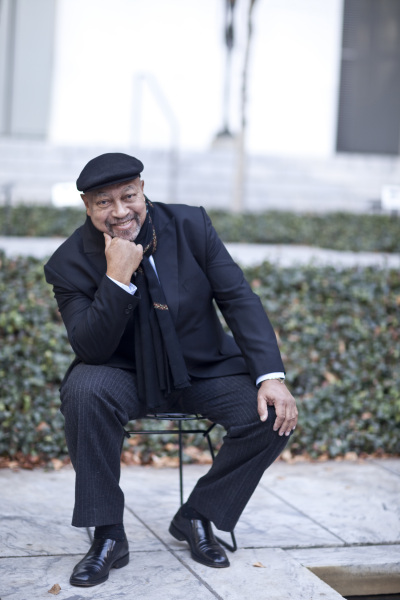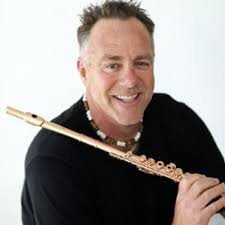Kenny Barron Trio: Transcendental Mastery On Display

Pianist Kenny Barron [photo courtesy of La Jolla Athaeneum]
In jazz, the piano trio holds a position similar to the string quartet in classical music. It is one of the few truly standard jazz formations, and it challenges musicians who choose it to rise to the impossibly high standards of its great historical practitioners. This trio with Barron on piano, Kiyoshi Kitagawa on bass and Johnathan Blake on drums accepted that challenge and delivered a stunning performance.
Dizzy Gillespie’s opening “Bebop” set the atmosphere and groove for the night. Taken at a crackling tempo, Barron’s adroit statement of the head wove seamlessly into an improvisational torrent that spanned chorus after chorus. Barron’s ease with two hand chord voicings left one astonished that so much music could come out of that Steinway nine foot case. Blake’s perfectly ergodynamic drum work impressed his listeners from the get-go with his display of beautifully placed sounds.
“Magic Dance,” a Barron original, followed on the heels of “Bebop.” The tune utilizes a standard AABA song form with extended sections. The melody seemed to unfold in a most logical manner and continued to blossom into a stunning piano solo that visited unexpected places. To my ears, some inherent weaknesses in Kitagawa’s playing began to surface here. The bassist has a fine rhythmic sense and demonstrates fluency with the most advanced harmonic idioms of post-bop, yet he always seemed to be playing in his own band or at least, contemplating an imminent divorce. In the piano trio format, each player must assume multiple roles. It is not enough for a bassist to outline the harmonic chord changes with great time: it is incumbent that he make a melodic commentary as well. If a particularly strong musical gesture is played by the one of the bandmates, there must be an abstracted, spontaneous reflection of it in the other instruments. Not a direct quote, but something redolent of the original idea.
This is why groups such as the Bill Evans Trio (with Scott LeFaro and Paul Motian), the Red Garland Trio or even the Nat Cole Trio (with guitar replacing drums) were so remarkable. Nothing seemed random, every musical gesture had its place. Kitagawa seemed to be hitting on two (laying down good time and outlining the harmonies) out of his three required roles.
On Thelonius Monk’s “Shuffle Boil,” a little known and rarely played gem by the man that Coltrane called “a musical architect of the highest order,” gave the entire trio an opportunity to strut their stuff within a wickedly complex and daunting environment. Barron, of course, absolutely nailed the head and then went on to create chorus after chorus of inspired, surprising and unique improvisations. The best was still to come when drummer Blake took over with a drum solo that was fresh and energetic.
The old master Barron now excused his bandmates for a solo turn. The pianist chose to visit four of his favorite ballads from the Duke Ellington/Billy Strayhorn canon. As if we were sitting in his living room, Barron traversed “Lotus Blossom,” “A Flower is a Lovesome Thing,” “Melancholia,” and finally the gorgeous “Star Crossed Lovers” as a medley. The audience was rapt, knowing that this was a privileged moment that we were witnessing.
In homage to Bud Powell, one of Barron’s primary influences, “Budlike” came up next on the agenda. Another Barron original, the work is reminiscent of Powell’s “Parisian Thoroughfare.” Barron lovingly gave us his take and then basically turned the rest of the tune over to drummer Johnathan Blake. He proceeded to come dangerously close to burning a hole in the stage floor with an astonishing and fiery drum solo. Maintaining the original song’s structural form perfectly (not an easy task!), the drummer then proffered a study on melody of the percussive persuasion, utilizing complex rhythms and frightening pyrotechnics over ten-plus emotion-filled choruses.
At one point, the drummer played an entire chorus of solo after shifting the time in what is called a “metric modulation,” a technique rarely encountered outside the halls of new music academe. To have done so is perhaps just this side of genius. The only other drummers in the history of jazz that I can compare this young man to are Max Roach and, perhaps, Jack DeJohnette. Yes, he really is all that. The entire audience sat mesmerized and finally, astonished throughout the lengthy solo. Clearly, Blake is one of the most brilliant percussive stars in the firmament of jazz today.
“Cooks Bay,” an original, calypso beat tune inspired by a trip to Tahiti, closed the program gently and melodically. It was the perfect balm after the scorching we had all received in “Budlike.” The band was called back to the stage for a final encore, Gary Bartz’ dedication to Monk entitled “Uncle Bubba.” The song title was originally a Monk family name bestowed upon Bartz.
It is rare to sit in the presence of such transcendental talent and accomplishment. Kenny Barron is obviously one of the greatest jazz musicians to have ever graced this planet.

Yochanan Sebastian Winston, Ph.D. has performed throughout the United States, Europe and Latin America. His repertoire spans classical, jazz, klezmer, new age, contemporary, rock & roll and pop and is very active as a composer. Dr. Winston holds a Ph.D. from the UCSD, a Diplôme from the Conservatoire National de Region de Boulogne-Billancourt (France), and a Master’s and Bachelor’s of Music from the Manhattan School of Music in New York City.
